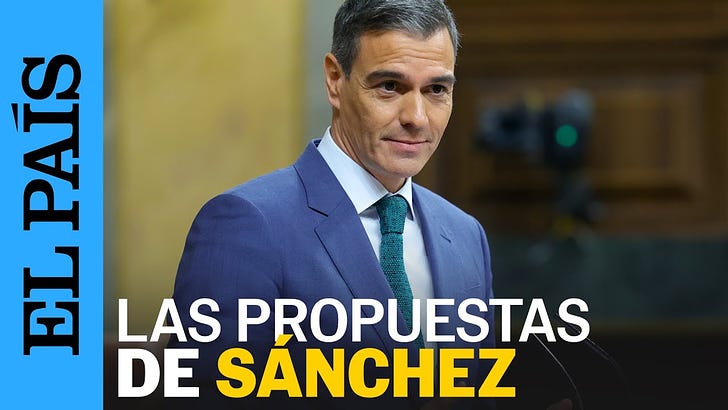♻️ This Week in Spain: What Is 'Democratic Regeneration'?
Also: Spain wins the Euro Cup and an alleged espionage scandal against Podemos.
By @IanMount and @AdrianBono | July 18, 2024 | Madrid | Issue #66
🎉 Welcome to The Tapa, an English-language, weekly newsletter about all things Spain!
🥜 This Week in a Nutshell: Last time we checked it was still summer, which means it’s a slow news week (or actually month). PM Sánchez introduced his plans for “democratic regeneration” in Parliament but we’re all still hungover from celebrating the Euro cup championship so it’s hard to pay attention. We’ll try, though.
🙏 Remember that if this email gets truncated at the bottom because it’s too long, just click here to read the rest on Substack.
🙌 One more thing: Remember we are offering paid subscriptions, and we’d be thrilled if you purchased one to help build this enterprise we’ve had so much fun creating. (And to those of you who have already subscribed, thanks for the love 🥰.)
🕺If you haven’t subscribed yet, please do so by clicking on the button below.
🫶 And if you already have, please send this newsletter around to your friends and family and help us keep growing.
Nothing burger alert
♻️ PM Sánchez Introduced His Plans for a ‘Democratic Regeneration’ and They Are… Not That Revolutionary
Prime Minister Pedro Sánchez has for several months been on his very own crusade against “fake news” and disinformation. And now he’s introduced a plan to push it forward, with the very Orwellian name of “Democratic Regeneration.”
You may remember (or not): Sánchez decision to declare war on “fake news” came after his self-imposed five-day lie-in back in April, when a judge’s decision to investigate his wife Begoña Gómez based on news articles (often in dodgy outlets) made him sad/say he questioned whether he wanted to continue as PM. (The entire country couldn’t sleep for five days after his cliffhanger letter, remember?)
Maquina del fango: In Sánchez’s words, this threat, which he calls “the mud machine” (from Umberto Eco’s maquina del fango), appears in the shape of “pseudo-media outlets” that churn out damaging content against his progressive government and allies.
New plans. Sánchez is saying it’s time to put a stop to the public funding of some of these publications, so after a few months hinting at what he called a plan for “democratic regeneration”, he finally appeared before Parliament yesterday to outline how he plans to make the media great again and regenerate democracy like lizards grow back tails.
The result? Well… not that much of a game-changer. Or maybe it is, but he didn’t offer a lot of details about he would do many of the things he said he wanted to do. In short, we were hoping for a movie and all we got was the trailer.
‘Democratic regeneration’ looks like this
Sánchez said his initiative will bolster transparency, safeguard media independence, and promote informed political discourse. Its four pillars will be “transparency, independence, pluralism, and the protection of the practice of journalism”. Which are big words but not actually plans. Still, he outlined a few proposals. Here’s a summary.
Ownership disclosure. Sánchez’s plan includes measures to force media outlets to disclose their ownership structures and any state advertising revenue they receive.
Ad restrictions. He also wants to restrict state advertising and public funding for media outlets in order to, he says, protect editorial independence, ensuring that media organizations can operate without political or business pressures. It’s unclear if this would affect big publicly funded media like RTVE (slanted toward Sánchez), Telemadrid (slanted toward Ayuso) or TV3 (slanted toward Catalan separatists)—or if it’s just aimed at tiny, annoying outlets.
Digitalization. Sánchez says he wants to help the digital transformation of the media sector with €100 million of public funding to enhance the media’s digital capabilities and help them to adapt to the rapidly changing media environment.
Libel redo. He also said he would like to “strengthen citizens’ rights to honor and rectification.” He didn’t explain what that means, but El País mentioned that this proposal aims to “enhance control over the dissemination of knowingly false or recklessly disregarded information, with possible governmental sanctions following judicial condemnation.” So, like, tighter libel laws.
Gag Law: One of the most interesting aspects of his plan is the proposed reform of the controversial “Ley Mordaza” or “Gag Law” from 2015, which was highly criticized by international organizations and the foreign media. And us too.
You can now insult the king. Once again, he didn’t offer any additional details. But Second Deputy PM Yolanda Díaz (from Sumar) said on Tuesday that her party and PSOE had agreed to include in their plans the repeal of “all offenses related to insults and public freedoms.” PSOE government spokesperson Pilar Alegría for her part said the reform would solely address “offenses related to insults.” In other words, you will probably be able to insult the royals without worrying about going to jail (which, to be honest, is a move away from the Middle Ages).
You must debate. Lastly (but not leastly), Sánchez announced that he would push for mandatory participation in electoral debates for all political candidates.
Keeping peeps in the know. This measure would seek to create a “more informed electorate” by ensuring that voters can hear directly from candidates about their positions (instead of getting information from a distant uncle on WhatsApp).
Reactions from everyone else. In fairness to Sánchez, most of what he announced yesterday aligns with the European Media Freedom Act (which — surprise! — was supported by the European Popular Party members) and its regulation must be implemented in all 27 EU member states by August 2025.
But, as you can imagine, this didn’t stop the enemy fire once Sánchez went back to his seat (in fact, there was some friendly fire as well).
You are fake news! PP leader Alberto Núñez Feijóo pulled no punches. As soon as he started speaking, he went after the legal troubles affecting Sánchez’s wife and his brother.
Not really about stopping fake news. Feijóo said Sánchez’s proposal was a bid to “punish the media that report on the corruption that touches him” (i.e. the Caso Begoña), adding that Sánchez is the one who “should be accountable” because “he’s the biggest fake news of all”.
Spain’s problem isn’t the freedom to defame. Feijóo added that while the European regulation must be complied with, “there is no impunity for defamation in Spain,” and thus Sánchez’s plans “could end with the greatest attack on freedom of expression” in the country.
Santiago Abascal from far-right Vox also criticized the €100 million for the digitalization of media, saying that “the media are already digitalized” and that Sánchez’s goal is “to buy editorial lines”.
There was also criticism from some of the government allies and frenemies who appeared to say Sánchez’s plans didn’t go far enough or were just a total meh nothingburger.
Sumar MP Íñigo Errejón said he preferred the term “democratization” rather than “regeneration” in order to “socialize power”. Translated: “I care about other problems and want the media in the hands of the people not big companies.”
Catalan separatist MP Gabriel Rufián (from leftish ERC) asked Sánchez: “What did you come here to do today? You haven’t announced anything that is an initiative of this administration” (in case you forgot, ERC is an on-and-off ally of PSOE’s current coalition government).
Troll attack. Rufián, who loves to troll literally everyone, also questioned the whole “democratic regeneration” concept. “How many times have you said that Spain is a full democracy?,” he asked. “Why does a full democracy need a democratic regeneration plan? Maybe it is not a full democracy. Maybe Spain is a democracy with enormous shortcomings.”
Disinfo probs. He did admit, however, that disinformation is a big problem in Europe, adding that the problem lies with “mobile phones” where “people are sought to vote for things that make them worse off.”
Now it’s up to Prime Minister Pedro Sánchez to move forward and start a) providing additional details about how he plans to achieve all of this and b) convince his allies to support him. Right now it looks like an uphill battle.
More news below. 👇👇
🔔 But First, A Message From Our Sponsor
Bucólico Café is a project of connection that was born as a specialty coffee shop.
We value time and understand that it represents both a cycle and an instant—chronology and nostalgia. Bucólico is a space that connects one’s soul with the purity, lightness and beauty of the countryside—while being in the city. Via a cup of coffee, a piece of cake or a song…
Located on Calle de Barbieri 4 — a few blocks from Plaza Chueca — Bucólico reassures the soul with a feeling of home.
Follow Bucólico Café on Instagram.
💬 Five things to discuss at dinner parties this week
1. 🕵️ Alleged espionage against Podemos
The past is never at rest and sooner or later it comes back to haunt you. And now it’s back in the shape of a scandal involving the illegal surveillance of MPs at the hands of the government back when it was in the hands of the PP. (Or so it seems.)
Back in late 2015, when Popular Mariano Rajoy was PM, Podemos was a force to be reckoned with. That was the year when the fresh, far-left party entered Parliament with 69 MPs (a very high number, seemingly ending Spanish bipartisanship). And it looks like the center-right government, threatened by their rapid rise, may have decided to keep an eye on all of them. A very close eye on all of them.
Enter the “Patriotic Police”. New information just came to light indicating that between 2015 and 2016, surveillance was conducted on most of the Podemos MPs through an extensive use of police databases without judicial authorization. Among those targeted were prominent figures such as former Deputy PM Pablo Iglesias, current Second Deputy PM Yolanda Díaz, current Podemos leader Ione Belarra, and former Equality minister Irene Montero.
The investigation started in February of this year after Podemos filed a lawsuit against the National Police and the Rajoy-era Interior Ministry before the Audiencia Nacional.
Larger strategy. The documents reveal that the alleged espionage was part of a broader strategy by the PP to try and discredit Podemos deputies. Francisco Martínez, the then second-in-command at the Interior Ministry, coordinated these efforts, which included investigating potential criminal backgrounds or controversial past activities of Podemos members.
Texts don’t go away. Some pretty damning text messages between Martínez and a police source asking him for dirt on all of them doesn’t help his case. El País reported that information turned over by Internal Affairs showed the operation involved “hundreds of unauthorized queries into police databases like Argos and Sidenpol, focusing on personal data, travel history, and other private info. For example, Pablo Iglesias faced 121 searches, while Yolanda Díaz was subject to 401.”
Podemos current and former leaders are furious at the revelation, as it seemingly confirms something they have insisted on for a while: that they were being spied on for their political leanings, going against the European Convention on Human Rights, which protects individuals’ privacy against unjustified public authority intrusion. (They are probably also thrilled about the revelation, because it means they’re back into the news after sinking into months of irrelevance.)
Sumar MP Íñigo Errejón (who back then was a member of Podemos) asked PP leader Núñez Feijóo in Parliament yesterday to apologize on behalf of his party after learning he had also been spied on. And… no luck on that one.
Nothing to see here. However, the version coming from the other side is completely different, because what is reality anymore?
Martínez denied any wrongdoing and said that the multiple police searches conducted on the Podemos MPs were “routine police activity” and that they were standard procedures coming from police stations from all over Spain “similar to those performed on any citizen for various reasons, such as passport renewals or airport checks”.
He denied any deliberate attempt to gather compromising information against Podemos members for political gain and criticized the Internal Affairs report, saying it doesn’t prove anything at all as these searches were “coincidental” and even included people who had the same name as the MPs but were not the MPs.
The investigation is still ongoing and it is now up to the judiciary to determine whether there was any wrongdoing. We’ll keep you posted—we haven’t seen the end of this.
2. 😎 Hot enough for ya? (Part 74)

Today is the day we’ve all been waiting for (drumroll please)… it marks the beginning of—you guessed it!—the first heat wave of the year!
And we know YOU ARE PSYCHED! Because you too have just gotten your air-conditioning installed. You did, right?
But seriously folks, it’s hot as Venus out there. The Agencia Estatal de Meteorología (Aemet to its friends), has pegged today as the launch of our first real heatwave, with temperatures hitting up to 44°C (111°F) on Friday.
Yes, Friday will be hot. Aemet says that throughout the day temperatures will range between 40 and 44°C in Albacete, Badajoz, Cáceres, Ciudad Real, Córdoba, Granada, Guadalajara, Lleida, Jaén, Logroño, Madrid, Murcia, Seville, Toledo, Teruel and Zaragoza, among others.
Who doesn’t love “torrid” nights? ”Exceptionally high temperatures” will affect practically all of Spain—except the northwest and the Cantabrian zone—with “tropical nights” (not dropping below 20°C) and even possibly “torrid nights” (not dropping below 25°C) in much of the southern half of the peninsula, the east coast and the Ebro valley. SO, like EVERYWHERE.
Ever better? Aemet says, “El calor viene acompañado de calima.” Yup, that gnarly red dust from North Africa—aka calima—will fall on us as we’re baking. Joy!
The upside of all this? Aemet’s weather map makers only needs their red and orange pens for the next week!
3, 4 & 5 (because it’s a slow news week!)
⚽ La Roja’s win in the Eurocopa is Spain in a nutshell—politics included
Spain’s victory in the Euro 2024 made (almost) everyone happy—more about that almost in a bit—but as much as we love football and winning things we couldn’t write one smart thing about onfield strategy. But politics? Oh, we know that. And Spain’s team—and the reactions to its victory—are full of it! Let us count the ways.
Lamine Yamal and Nico Williams
The tournament’s biggest revelations for the world of football—and for Spain—were without a doubt Lamine Yamal and Nico Williams. Not only because they both had fantastic tournaments, seem to be best friends, and are young (Yamal turned 17 last week, Williams 22). But also because in Spain they stood out for being Black.
Williams is the child of Ghanean immigrants Félix Williams and María Arthuer who got to Spain in 1994 by crossing the Sahara and climbing over the fence that surrounds the Spanish African outpost of Melilla (María was pregnant with Nico’s brother Iñaki who, like Nico, plays for Athletic in Bilbao; he was named after Iñaki Mardones, the priest who helped them when they arrived). Nico was born in Pamplona.
Yamal’s parents are Mounir Nasroui, of Morocco, and Sheila Ebana, of Equatorial Guinea. Yamal grew up in the Rocafonda barrio of Mataró, 30km northeast of Barcelona, and he often makes a hand gesture signifying 304, a reference to Rocafonda’s postal code. Yamal’s father Mounir was fined last year for attacking and throwing eggs at Vox supporters and a stand they’d set up in immigrant-heavy Rocafonda (because you know how much Vox loves immigration).
It was almost inevitable that Yamal and Williams would become political chess pieces.
Vox, which in all its intellectual glory 🤣 likes to call immigrant-heavy working class neighborhoods like Rocafonda “multicultural shitholes”, promptly stepped in it when its Andalucia spokesman, Manuel Gavira, couldn’t just stop with “I loved the goal” (which he said) about the amazing tying shot Yamal scored against France, and had to say, “If Yamal hadn’t scored it, someone else would have” (really, had to say that?). To which the PP’s Cayetana Álvarez de Toledo (no left-winger herself) snapped back “Lamine Yamal. And long live Spain” as if to tell Gavira to grow up.
The Socialist candidate to lead Catalonia, Salvador Illa, said a few days later that “Each goal of Lamine Yamal is a goal against the extreme right”, and right-wing pol Rosa Díez called this move (which an ally called “totalitarianism” for using a football player as a political weapon”) “repugnant” and said socialists were “garbage.”
To coin a phrase, this is why we can’t have nice societies. Could we accept that Spain is just now more diverse than it was and at the same time that not everyone making that so wants to be used by others as a political advert? Even the right-leaning ABC seems to have figured that in its article, “The national team of all origins.” As did the band Estopa, with “Lamine... Yamal... ¡Cada día te quiero más!”
Basque country
Seven players on the national team are from Basque Country and Navarra. And Basque separatists/nationalists are NOT VERY HAPPY about this.
A sign appeared Monday in the Basque town of Elorrio. And it was not to celebrate the national team and the Basque players on it.
Instead, it said, “No to the assimilation of the Spanish National Team” and featured the Basque flag, a crossed out Spanish flag, and on the steps underneath were painted the names of two Basque players—Mikel Merino, who scored the overtime goal that sent Spain past Germany in the quarterfinals; and Mikel Oyarzabal, who scored the winning goal in the final. Beneath their name was the word “traitors”. Oh, and there was also a crossed-out swastika, so whoever put the sign there is also against nazis. Which is nice.
Basque separatist party EH Bildu’s boss Arnaldo Otegi also took the time on Monday to add that "I will never be happy when Spain wins. It is not my team, it is not my King and it is not my anthem" and that the reason for that was that Spain doesn’t let the Basque Country have its own national team—so it could be like Wales and Scotland (and lose most of the time except to San Marino and Cyprus).
The national government’s delegate in Basque Country replied by calling the sign in Elorrio an “isolated incident from intolerant people who refuse to accept the Basque reality, a plural and diverse society that normally and without prejudice enjoyed the victory of the Spanish team last night." Which sounds about right.
PM Pedro Sánchez and the love or lack thereof
Politicians love to have their photos taken with winning national teams. It’s like political MDMA. Me! Winners! Success Rubs Off! But that wasn’t exactly Prime Minister Pedro Sánchez’s experience this week.
Jokes and smiles all around. King Felipe VI visited the team dressing room after their victory over Italy in the group stage, and there was buena onda (good vibes, natch) between F6 and the players.
Not so with Pedro. The captains of the team—Álvaro Morata, Rodrigo Hernández, Jesús Navas and Dani Carvajal—apparently made it clear that they did not want Sánchez to visit the dressing room after their win over Germany in the quarter finals.
But why? It could have been that they had sympathy for football federation head Pedro Rocha (who took over from mad kisser Luis Rubiales) and felt that Sánchez’s government was behind the case against Rocha that ended with a two-year suspension for abusing his authority. It could have been that they didn’t like how they were being used politically, or didn’t like Sánchez’s politics (more on that in a sec). Or it could have been, as (far-right) media OKDiario reported, that they were angry that he didn’t make time to receive them after the team won the UEFA Nations League in June 2023. Either way, no buena onda.
And just to be clear. When Sánchez was greeting the team in a receiving line upon their return from Germany Monday, there was not a lot of love from the players—especially not from Carvajal and Joselu—who basically barely touched the PM’s hand and stared at the ground as they walked by. Why? Could be the same reasons, perhaps augmented because Carvajal is thought to be politically right of center (his dad is a policeman and after Rubiales’ kissgate he declined to speak out against Rubiales “before knowing all the facts” and talked about the “presumption of innocence”.)
Gibraltar es español
And now, El Peñon. You’re Spanish and you beat England in a football final—so what do you do? You start chanting “Gibraltar is Spanish!” obvs! Because it was Spanish until Spain ceded it in 1713 through the Treaty of Utrecht, and it’s been in people’s craw ever since.
Spanish players Álvaro Morata and and Rodrigo “Rodri” Hernández began chanting “¡Gibraltar es español!” at the celebration outside of Madrid’s city hall, getting the crowd into the jam (and Madrid Mayor José Luis Martínez-Almeida “danced” along). Later, Almedia defended the chant as “something a lot of Spaniards think” and asked why people were complaining about Carvajal’s cold greeting of Sánchez, asking “What grade of effusiveness is sufficient? Are we going to regulate that?”
Gibraltar gov and English press angry 😡! Gibraltar’s government called the chant “rancid” and Chief Minister Fabián Picardo called it “worse than disgusting” for glorifying the “dictatorial politics of a mass murderer like Franco and his fascist regime's attempt to usurp a neighboring territory” (we thought they were using a soccer victory to get in a jab over a sore point, but what do we know 🤷?).
Now, maybe back to actual football?
🙏 Before you go, please remember to share this newsletter with your friends on social media. The more we grow, the more information we’ll be able to offer each week.







Too kind!
3, 4 & 5 (because it’s a slow news week!) - you're forgiven! It is always such a joy to read you guys.